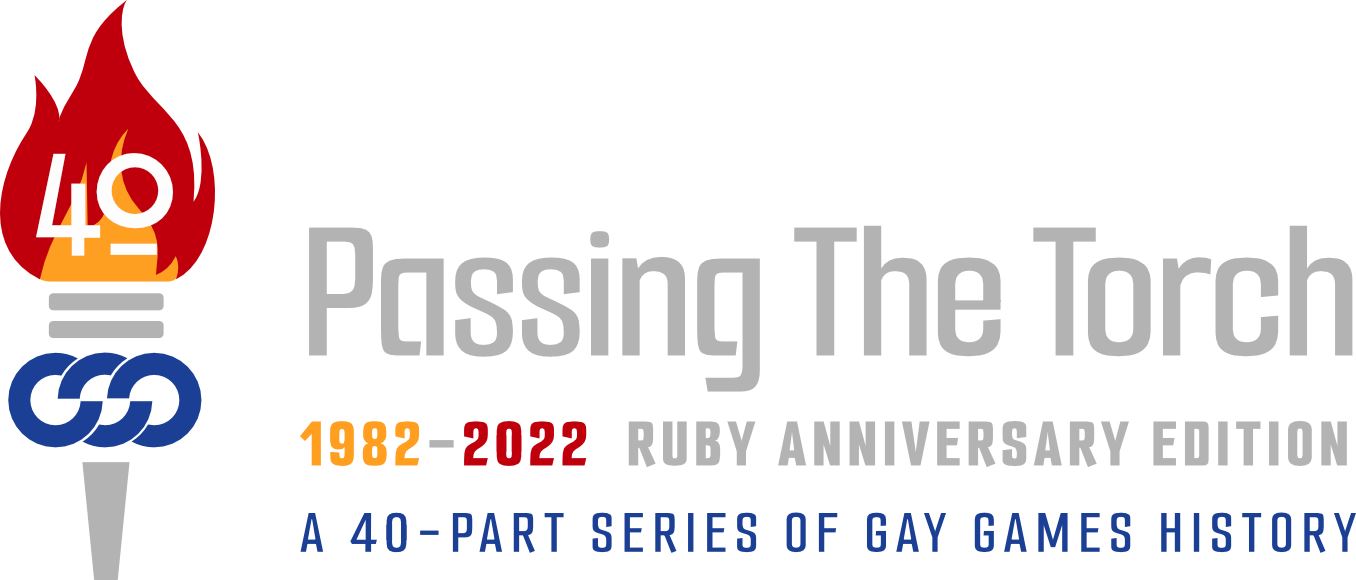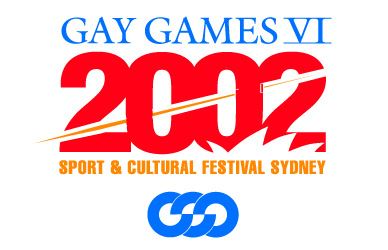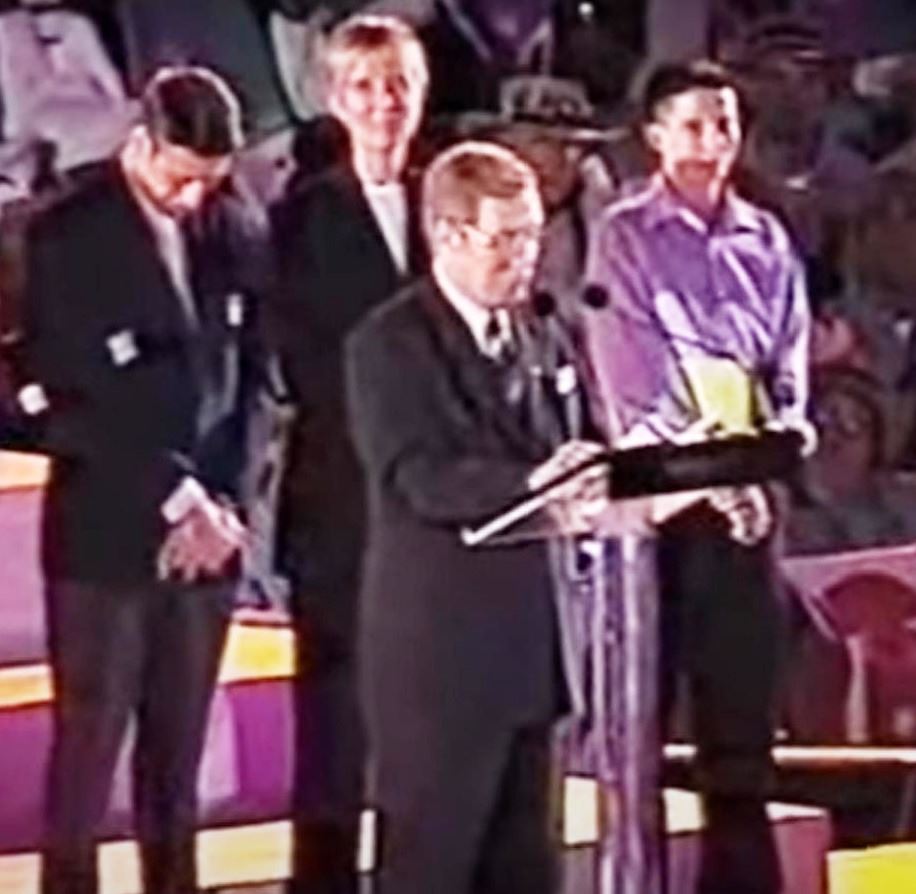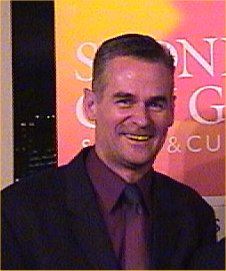Gay Games VI - Part A

Produced and curated by Federation of Gay Games Archivist Doug Litwin and FGG Honourary Life Member Shamey Cramer
with Ankush Gupta, FGG Officer of Communications
Read the entire "Passing The Torch" series as it is posted daily HERE.
Post 14a of 40 - 10 August - Gay Games VI
“Passing The Torch: Ruby Anniversary Edition” is a factual timeline of the major events that have been part of the Gay Games evolution since its inception. The series will run from 28 July 2022 - one month before the 40th anniversary of the original Opening Ceremony at San Francisco’s Kezar Stadium - through 5 September, the anniversary of Gay Games I Closing Ceremony. All postings will remain online and available for viewing at the FGG website.
* * *



Gay Games VI Opening Ceremony and local banners
JEFFRY PIKE: The first distribution of Coe Scholarship Funds to participants occurred for Gay Games VI - Sydney (2002), which had a scholarships coordinator, Jorge Alvarez, and a set of criteria similar to Amsterdam’s. Nineteen recipients received Coe Scholarship funds and traveled to Sydney; in total, Sydney awarded 515 scholarships.
“... I am walking around like wow all these people are here to play sport, and all these people are gay and wow they are all proud of themselves, and I think that is really great for me, and I think that for somebody who wasn’t sure of themselves, it would be so much more helpful.”
— Melbourne,Australia
Event: field hockey (goalie) Silver Medal
“... This was my first time overseas, I didn’t know anything about the world, but still I came. I came here. ... The sense of community, the sense of unity is just great, it’s amazing. ... I consider this to be my once in a lifetime dream which was realized after coming to Sydney. I am happy; I am content.”
— Mumbai, India
Event: Performed Classical Indian dances in the Open Stage series
“This has been a wonderful experience on the primary level of not feeling alone in the Philippines. To meet other lesbian artists and other gay artists, and to know that there are a lot of lesbian and gay artists all around the world, and that we experience the same problems, I think is has been a great boost for me as a person.
— Manila, Philippines
Events: Art exhibition and Badminton
* * *

Justice Kirby at 2002 Gay Games VI Opening Ceremony with FGG Co-Presidents Roberto Mantaci and Kathleen Webster behind him
KATHLEEN WEBSTER: The excitement built as the athletes and artists began to fill the Sydney Football Stadium for the Opening Ceremony of the 2002 Gay Games VI in Sydney, Australia. There was also just a hint of nervousness. The horrific events of September 11 had happened a short year before and the bombings in Bali less than a month prior to Opening Ceremony – and here we were beginning a joyous celebration of LGBT community, inclusion and empowerment through sport and culture. Despite these tragedies and a global economic downturn, thousands of participants from more than 70 countries filled the stadium.
The night marked a new chapter in Gay Games history as this was the first held in the Southern Hemisphere. Indeed, the Gay Games VI slogan was “Under New Skies.” The joy on the faces of the participants and their families and friends was beautiful to behold.
While I had the honor of serving then as the female Co-President for the Federation board, it was the first time I had the challenge of speaking in front of a stadium with more than 10,000 people. As I stood behind the stage nervously looking out over the crowds, Dame Marie Bashir, the governor of New South Wales, the Queen’s Representative who was to open the 2002 Gay Games, so graciously linked her arm in mine and assured me I would be just fine. As I began to speak, the first sounds of applause showed me she was right.
One of my most powerful memories was when Justice Michael Kirby, Justice of the High Court of Australia, addressed the crowd. Here are excerpts from his speech:
"At a time when there is so much fear and danger, anger and destruction, this event represents an alternative vision for humanity. Acceptance. Diversity. Inclusiveness. Participation. Tolerance and joy. Ours is the world of love, questing to find the common links that bind all people. We are here because, whatever our sexuality, we believe that the days of exclusion are numbered. In our world, everyone can find their place, where their human rights and human dignity will be upheld.
We have not corrected all these wrongs. But we are surely on the road to enlightenment. Tonight, we are part of it. There will be no U-turns.
Little did my partner Johan and I think, thirty years ago, as we danced the night away at the Purple Onion, less than a mile from this place, that we would be at the opening of the Gay Games with the Queen's Representative and all of you to bear witness to such a social revolution. Never did we think we would be dancing together in a football stadium. And with the Governor. And that the Governor would be a woman!"
The mood of celebration and triumph only continued to grow as local, first-nation and guest artists entertained the crowd through music, dance and spoken word – all emphasizing openness, inclusion and love despite our struggles. The evening featured a moving tribute to indigenous cultures, recognition of the jailed immigrants in Australia’s history, various entertainers including Jimmy Sommerville, and a joyous, festive athletes parade to fill the stadium. k.d. lang was a highlight of the evening to close out the ceremony as, with candles lit across the stadium, she came onstage barefoot and filled all our hearts with hope as she sang Rogers & Hammerstein’s “You’ll Never Walk Alone” with the Gay & Lesbian Choirs of the World. She followed up with Garson & Hilliard’s “Our Day Will Come” as the crowd danced and rejoiced. And then she lay onstage while the entire stadium serenaded her in return with “Happy Birthday.” It was truly a night to remember under new skies.
With each Gay Games we demonstrate to the world that we are committed to joy, action and the limitless possibilities that transformation can bring. The Gay Games change lives. They are one step in the progression to full and complete recognition in all of our endeavors that are an integral part of human and civil rights.
To see the video of Justice Kirby’s full speech at the opening of Gay Games VI, click HERE
* * *

Gay Games VI Aquatics Center
KATE ROWE: I became part of the Sydney bid for cycling and we won, and became an observer to what did and didn’t work.
For the next four years, my life WAS the Gay Games. Incredibly stressful at times. Inclusion of women and transgender was policy of Sydney, with specific strategies to include more women in sports and on the administrative side.
Sydney increased women's participation to 42% - still a record. Sadly, that was the last time that efforts to target women was made. Something that the current and future boards still need to address.
Call me biased, but i still think that the actual standard of organisation of the sports was the best in Sydney, and continues to have that status. This was thanks to the incredible sports director Stuart Borrie. It was his passion, communication and professional skills that inspired so many of us take the Gay Games to a new level.
The Opening Ceremony was awesome and creative, with the speech by the Hon. Justice Michael Kirby not only a highlight, but still remembered.
Sydney had the second highest number of participants at 12,500. Never surpassed even 20 years later.
* * *

South African soccer player at Gay Games VI
HLENGIWE BUTHELEZI: This was my very first experience to be within an openly gay community in one venue who were free to be themselves. It was such an overwhelming experience; and I remember the South African team talking about it to say “if only we could live such a life back home.” In South Africa, we were still in the infancy of our democracy after apartheid segregations, so it was even intriguing to be amongst so many white communities but didn’t feel any rejection. Instead, we were warmly welcomed.
The Opening Ceremony was overwhelming! Then we got down to running business and it turned out just fine: 7 medals (2 Gold, 3 Silver, 2 Bronze). Unfortunately, nothing for our Soccer team but they were super excited to be part of the whole experience.
The main thing that came out of these games was the fact that we went back home and the Forum Empowerment for Women (FEW) which is LBT organisation was born which later on formally introduced the ladies’ soccer team, Chosen Few FC when I had relocated back to Durban. Well I got back in the country feeling good and confident about my sexuality even though I would still have had to mind many things while the homophobia was rife.
* * *

Stuart Borrie at Gay Games VI 2002
STUART BORRIE: In Denver Colorado, on 13 November 1997, the Federation of Gay Games (FGG) announced Sydney as the host city for Gay Games VI at the conclusion of a long bid process with five cities in the running - Dallas, Long Beach/Los Angeles, Montreal, Sydney, and Toronto.
The welcome message in Sydney’s bid book focused on the unique aspects of Sydney’s bid - the first Gay Games in a new millennium and in a new region of the world:
We invite the Federation to bring the Gay Games to a new hemisphere, with a fresh perspective, a different view and under new skies.
In a land once linked with Africa and South America, and now a junction of Asian cultures, European influences, and our own unique lifestyles, we say G’day.
Australia’s cultures come from near and far, migrants who left other shores in recent generations to establish communities here joining the Aboriginal tribes whose ancestors made their own journeys to this land tens of thousands of years before.
The symbol of Gay Games VI reflects our theme, combining Australia's seven-pointed Federation Star and the rainbow colours of our evening lights. We warmly invite the world to the first Games of the new millennium… under new skies.
The two-year journey to Denver and the successful bid was not an easy one and what followed would challenge the Sydney 2002 Organising Committee and the LGBT community in which the event would take place.
The task was monumental – to bring together talented people (who were for the most part volunteers), governments, business and sports partners as well as the funding (both cash and value in-kind) – in order to further develop the bid plan into a realistic and achievable master plan that would deliver a successful Sydney 2002 Gay Games VI and Cultural Festival.
Sports Programme
As the Director of Sports for the bid company (a fully volunteer organisation), I was responsible for bringing together the partners to help plan the sports programme for the bid for Sydney 2002 Gay Games VI and eventually the Games itself.
From the very start, we knew we had enormous experience and knowledge in our community and we had to tap into this and bring along with us, those who would help us plan and deliver their sport.
Partnerships were essential and this included four main groups:
- Team Sydney - as the umbrella organisation for gay and lesbian sport in Sydney.
- Gay and Lesbian Sports Clubs – experienced in delivering annual sports events.
- State and National Sports Governing Bodies – for technical support / sanctioning.
- Venue owners and operators.
We were fortunate to garner support from sports community leaders, both in our LGBT communities but also in the wider sports community in Sydney and beyond. But this did not come easily for the bid and for the planning team once Sydney was awarded the Gay Games.
Brand and Credibility - What, Why, Who, and How?
Brand development, communication and consistent messaging were essential throughout the bid and the lead up to the Games.
The Gay Games brand was not well known in Sydney and Australia so much effort was put into explaining the concept of an inclusive sports event for all where participation and personal best were key.
As an organisation, and as individuals, we were constantly answering questions about what? (are the Gay Games), why? (do you need a separate sports event when integration is your goal), who? (are the Games for – doesn’t it discriminate against straight people) and how? (are you going to organise it and pay for it!).
This communication was as much about educating our own diverse LGBT community in Sydney and Australia as it was about educating the wider community including State and local governments, sponsors, business partners and supporters, State and national sports associations, and venue owners and operators.
It was about building a shared understanding of the Gay Games values and the credibility of the host organisation and its capacity to plan and successfully deliver a mass participation multi-sport event.
Sports People and Sports Partnerships
Sydney’s well established gay and lesbian sports clubs were the starting point as they had significant experienced in running events every year, and established relationships with State governing bodies for sport.
Initially we sought sport plans from as many of the clubs and associations as a starting point and then developed these into a programme of sports. There were core sports that were required to be delivered, and then some new sports that put a unique stamp to the Sydney Games.
As an Organising Committee we needed to reach out to sports governing bodies – state, national and some international sports federations) to secure volunteers, technical expertise in logistics and operations and to help develop competition schedules, procure equipment and finalise a day by day programme of events for expected numbers of participants.
Organisational Structure / Sports Department
Developing a Sports Department within the Organisng Committee was an essential task. 12 months out from the Games this consisted of the Sports Director, six paid Sports Managers, who each managed a number of sports, and a total of 80 volunteer Competition Committee Managers.
Each sport had a Competition Director and a Competition Committee as well as a team of volunteer managers and technical volunteers who would deliver the sports competition – often with volunteer support from State clubs and associations for each sport discipline.
Venue Plan
Sydney’s sports plan utilised sports venues in three main zones. These clusters of sports made logistics and planning easier, and provided opportunities at Games time for participants to easily become spectators of other events within a cluster of sports.
Sydney Olympic Park for example hosted nine sports all within five to ten minutes walk of each other.
- Sydney Olympic Park (48.3% of Games participants)
- Near Sydney Olympic Park (19.9% of participants)
- Sydney Harbour Zone (19.1% of participants)
- Other locations (12.7% of participants)
The legacy from the Sydney 2000 Olympic Games meant that the Gay Games in Sydney were able to use state of the art venues that were part of Sydney 2000. Sports Venues at Sydney Olympic Park were:
- Sydney Aquatic Centre (Swimming, Water Polo, Diving & Aqua Mania / Pink Flamingo)
- Sydney Athletic Centre (Track & Field)
- State Sport Centre (Volleyball - A, AA, B, BB Grades and finals)
- Sydney Indoor Sports Centre (Volleyball, Judo)
- Sydney International Hockey Stadium (Field Hockey)
- Sydney International Tennis Centre (Tennis)
- Sydney Olympic / Millennium Park (Marathon)
Delivery
Hosted from 2 – 9 November, Sydney 2002 Gay Games VI had 10,651 registered athletes from 64 countries participating in the 31 sports across 36 venues in Sydney.
It was truly an amazing spectacle to see at each venue LGBTQ+ athletes competing in a supportive sporting environment.
Ballroom dancing was offered for the second time at the Gay Games after the successes of Amsterdam 1998 Gay Games V. Sydney Town Hall with its ornate ceilings was the perfect venue for glamorous couples: women / women and men / men.
Sydney Aquatic Centre was alive on seven days of the Games with swimming, diving, and water polo finals. The competition pool witnessed numerous swimming masters records and hosted the fabulous Aqua mania / Pink Flamingo events.
On the Field of Play
- 31 sports across 36 venues
- 10,651 athletes from 64 countries
- 9 team sports - basketball, field hockey, ice hockey, netball, soccer, softball, touch rugby, volleyball, water polo
- 24 sports are the same as Amsterdam ‘98 (Bridge and Chess were official sports in Amsterdam, but in Sydney were part of the Cultural Festival)
- New sports for Sydney 2002 Gay Games - field hockey, netball, sailing, touch rugby
- 200 + participants have a specific need or disability
- 30 + participants who identified as transgender
- 1,170 athletes participated in 2 sports, 99 in three sports, and 20 participating in 4 sports
- 143 volleyball teams, 52 soccer teams, 41 softball teams
- 1,400 swimmers, 1,207 volleyballers, 1,281 runners in the marathon, half marathon, and 10km road race
- 1,087 track and field athletes, 1,049 tennis players, 727 triathletes, 622 bowlers
- 2,357 gold, 2,240 silver, and 2,240 bronze medals awarded
- Participation medals were given to all
* * *
Read the entire "Passing The Torch" series as it is posted daily HERE.
